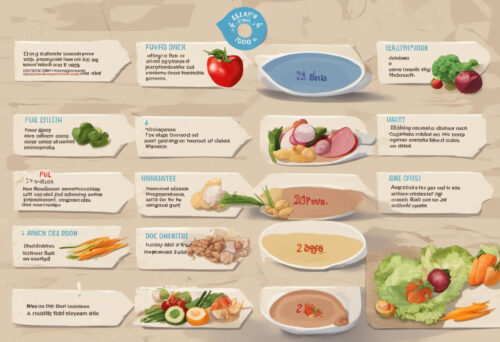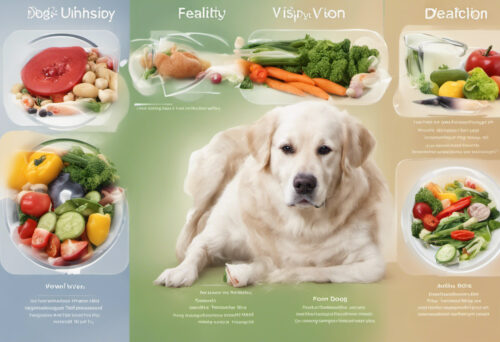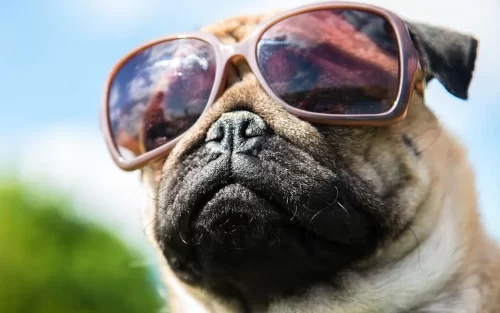We all know that we are what we eat and that same principle applies to our canine companions. Ensuring the right diet for your pooch is critical for their overall health and longevity. Yet, often overlooked is the profound impact of diet on a dog’s vision and eye health. Without the proper nutrition, dogs can be susceptible to a variety of eye problems which can compromise their vision, and in some instances, lead to blindness. In this article, we’re going to reveal how a thoughtfully planned diet can promote great vision and strong eyes for your furry best friend.
A Glimpse into Canine Vision
Understanding the canine vision and its uniqueness compared to human vision is a good place to start. Dogs, unlike humans, have a different structure of their retinas, making their vision primarily dichromatic, which means they see mainly blue and yellow hues. Humans, on the contrary, are trichromatic, allowing us to see red, blue, and green colors. Both dog and human eyes alike, though, require essential dietary elements for optimal functioning.
Role of Omega-3 Fatty Acids and Antioxidants
Omega-3 fatty acids are a key component in cell membranes and have a crucial role in maintaining the health of the retinal cells. Research supports the premise that dogs fed a diet rich in Omega-3 fatty acids may be less likely to develop some degenerative visual conditions, like optic nerve hypoplasia. Equally important are antioxidants such as Vitamins A, C, and E which are believed to protect eye tissues from damage induced by free radicals (AKC).
Choosing the Right Diet
Whilst many commercial dog foods are formulated with the essential nutrients your dog needs for general health, they may not have the optimal levels for good vision and eye health. It is now emerging that a specially crafted diet for your dog can provide a higher level of the essential nutrients that specifically promote healthy eyes and vision.
Foods that Protect Your Dog’s Vision
Some foods are particularly rich in the nutrients needed for good vision health. Fish, such as salmon and sardines, are abundant sources of Omega-3 fatty acids. Most dogs love the taste and will readily consume these types of fish. Vitamin A is critical for maintaining the surface of the eye and is ample in sweet potatoes and carrots. In fact, studies have indicated that Beta-carotene, which is the precursor to vitamin A, can help prevent retina diseases.
The Importance of Regular Check-ups
While providing a vision-friendly diet for your dog is highly critical, it isn’t a substitute for routine veterinary eye check-ups. Regular eye exams can catch any emerging eye problems early before they threaten your dog’s vision.
By now, you’re probably realizing how much of an influence diet has on your dog’s vision and eye health. The next time you’re filling your shopping cart for your canine companions, remember to get some vision-boosting goodies too!

Preparing a Vision-Enhancing Meal for Your Dog
Given this information, how can a conscientious pet parent like yourself actually prepare a beneficial meal for your furry friend’s eyes? Fear not—it’s easier than you’d think.
Tasty, Eye-Healthy Recipes
An option could be a salmon dinner with sweet potato side. The salmon, as mentioned before, is packed with Omega-3s, while sweet potato houses critical Vitamin A. Another possibility is to prepare a chicken and green peas dish with carrots as a side. Chicken is rich in B-vitamin niacin (Huffington Post), vital for eye health, while peas and brightly-colored vegetables like carrots are full of powerful antioxidants.
Supplements to Enhance Your Dog’s Diet
Aside from fresh food with power-packed nutrition, you can consider adding dietary supplements to your dog’s food (AKC). Certain supplements are designed specifically to protect vision and eye health through a blend of antioxidants, vitamins and Omega-3 fatty acids.
Watch Out for Overnutrition
While we can agree that certain foods and nutrients are great for your dog’s eye health, it’s also critical to remember that too much of a good thing can be harmful. Overnutrition or feeding your dog excessive vitamins and minerals can lead to toxicity (Tufts University). As always, consult your vet before changing your dog’s diet or adding new supplements to their regimen.
Diet Vs. Genetic Eye Conditions
Although a healthy diet can do wonders for maintaining your pet’s general wellbeing and eye health, it’s also important to note that some eye conditions may be genetically inherited (UC Davis Veterinary Medicine). Conditions such as Progressive Retinal Atrophy (PRA), Collie Eye Anomaly (CEA), or cataracts can be due to your dog’s breed and genetics, not diet.
Keep an Eye Out for Changes
Although regularly scheduled veterinary check-ups are essential, keeping an eye out for changes in between appointments can catch any potential problems early. Symptoms such as changed behavior, cloudiness, redness, excessive tearing, or even reluctance to go outside can be indications of vision problems.
Summing It Up
In conclusion, your dog’s diet can have a great influence on their vision and eye health. Omega-3-rich fish, vitamin-packed vegetables, and a smattering of other beneficial foods can help keep those puppy eyes bright and healthy for a long time. However, regular eye check-ups can’t be neglected, and symptoms of vision problems should never be ignored. Food is a potent tool in supporting your dog’s health, but it isn’t the only tool in the box. Make sure you use all the tools available to keep your best friend’s vision in tip-top shape.

Infusing a Little Exercise
While diet stands at the forefront of promoting eye health, let’s not ignore the positive influences regular exercise can make. A good romp at the park or fetch session boosts circulation, allowing essential nutrients from food to move around your dog’s body more efficiently. It ensures that your dog’s eyes are getting the nourishment they need. The (APOP).
The Value of Moderation and Balance
As with all things, moderation and balance are key. Focus on offering a well-rounded meal consisting of good quality proteins, healthy fats, and a variety of fruits and vegetables. A dog’s diet should be aimed at promoting overall wellness, and good vision will follow suit.
Eye Care Beyond Diet
Eating right is a grand step towards preserving your dog’s vision, but remember that eye health goes beyond it. Developing a routine of eye care practices like gently cleaning your dog’s eyes, providing them with protective eyewear in harsh weather or while adventuring, and avoiding hazardous substances like harsh shampoos and cleansers can be beneficial.
Routine Health Check-ups
Finally, along with a vision-promoting diet, regular veterinary exams are paramount! Vets can assess your pet’s eye health and catch early signs of visual impairment or disease. They can also guide you on the relevant tests and preventive care needed to maintain your canine companion’s optimal eye health (AVMA).
In essence, a healthy, balanced diet plays a pivotal role in maintaining your dog’s vision, alongside other health practices like regular exercise, hydration, and imperative vet check-ups. In the words of Ann Wigmore, “The food you eat can be either the safest and most powerful form of medicine or the slowest form of poison.” Let’s aim for the former and ensure our furry friends have the strong, clear vision they need to explore the stimulating world around them.



